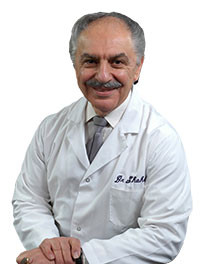Hyperlipidemia Treatment in Midland Park, NJ

Hyperlipidemia, also called hyperlipoproteinemia, is characterized by high levels of lipids (fats, cholesterol and triglycerides) or lipoproteins in the blood. These lipids can enter arterial walls and increase your risk of developing atherosclerosis (hardening and narrowing of the arteries) and heart disease, and lead to more troubling health concerns such as a heart attack or stroke.
Hyperlipidemia is defined by two types:
- Primary hyperlipidemia, also sometimes called familial hyperlipidemia, is hereditary and is transmitted genetically from either your mother or father. This is to say, the high cholesterol associated with primary hyperlipidemia is not caused by poor habits but is caused by a genetic disorder (specifically, a mutated gene which is passed on from a parent which causes a missing or malfunctioning LDL receptor, causing LDL to accumulate in the blood to a dangerous amount).
- Secondary hyperlipidemia, also called acquired hyperlipidemia, is usually caused by an underlying health condition like diabetes and hypothyroidism, but is also associated with poor diet and other negative external factors such as alcohol consumption and smoking.
Hyperlipidemia affects one-third of American adults, yet only 1 out of every 3 hyperlipidemia patients receive proper treatment. It is important that if you find you suffer hyperlipidemia signs and symptoms you report them to your healthcare provider. To schedule a consultation with a qualified healthcare provider in Midland Park that specializes in hyperlipidemia treatment, call (201) 806-6099 or contact Dr. M.T. Shahab online.
Hyperlipidemia Causes
A family history of the hyperlipidemia may be your biggest tipoff to a future diagnosis. Additional hyperlipidemia causes include:
- Poor eating habits, including excessive consumption of saturated fats and trans fats, which raise your blood cholesterol levels. These include cheese, egg yolks, fried and processed food, ice cream, pastries and red meat.
- Sedentary lifestyle and lack of exercise.
- Obesity
- Diabetes
- Tobacco smoking
Hyperlipidemia Symptoms
The hallmark sign of hyperlipidemia is high cholesterol (with yellowish fatty growths around the eyes or the joints).
Other hyperlipidemia symptoms could include high triglycerides and other fats in your arteries, and more serious health issues such as blood clots, heart attack and stroke, which may be precipitated by hyperlipidemia. These emergency health situations are brought on by excessive fat accumulating in the blood over time, which forms plaque on the walls of the arteries and blood vessels, in turn narrowing the openings to produce turbulent blood flow through the vessels and cause the heart to become constricted.
Hyperlipidemia Diagnosis & Treatment
Hyperlipidemia can be screened for by way of a blood test called a lipid profile. These screenings should begin at the age of 20 and, if normal, should be repeated every 5 years at the minimum.
If you suffer from hyperlipidemia, your healthcare provider will likely recommend immediate lifestyle changes to get your lipid levels under control and to support sustained health. A hyperlipidemia diet will likely be recommended and may include an array of foods rich in fiber, fruits, vegetables and whole grains. You should limit or eliminate foods high in carbohydrates, as well as any foods that do not offer significant nutritional value. Regular servings of fish, nuts and legumes will likely be recommended.
Your healthcare provider will also likely address your weight and recommend losing weight, which can lower your cholesterol and triglyceride levels as well as remove bad cholesterol from your blood. Becoming physically active by exercising for 30 minutes a day 5 days a week can help you lose weight and lower your chance of developing heart disease. If you are a smoker, your healthcare provider will likely tell you to quit smoking, as smoking is a primary contributor to heart disease, promoting plaque buildup on the walls of your arteries, as well as increasing your bad cholesterol, increasing your chance of blood clot formation and inflammation.
When medications are prescribed, they may consist of high cholesterol medications; medications can be discussed with your healthcare provider, keeping in mind your health state and whether you are a good candidate. Medication alone cannot eliminate the issues relating to your lipid levels; medication is only used in conjunction with a healthy lifestyle.
Meet with a healthcare provider who can help bolster your overall health and get your lipid levels under control. To schedule a consultation with a qualified healthcare provider in Midland Park that specializes in hyperlipidemia treatment, call (201) 806-6099 or contact Dr. M.T. Shahab online.
Medwell Orthopedics & Functional Medicine for Men & Women
Address
33 Central AveMidland Park, NJ 07432
(201) 806-6099
www.BergenCountyDoctors.com
Hours
Mon:
8:00 am - 8:00 pm
Tue:
2:00 pm - 7:00 pm
Wed:
8:00 am - 6:30 pm
Thu:
8:00 am - 1:00 pm
Fri:
8:00 am - 6:30 pm
Sat:
9:00 am - 1:00 pm
Sun:
By Appointment Only


